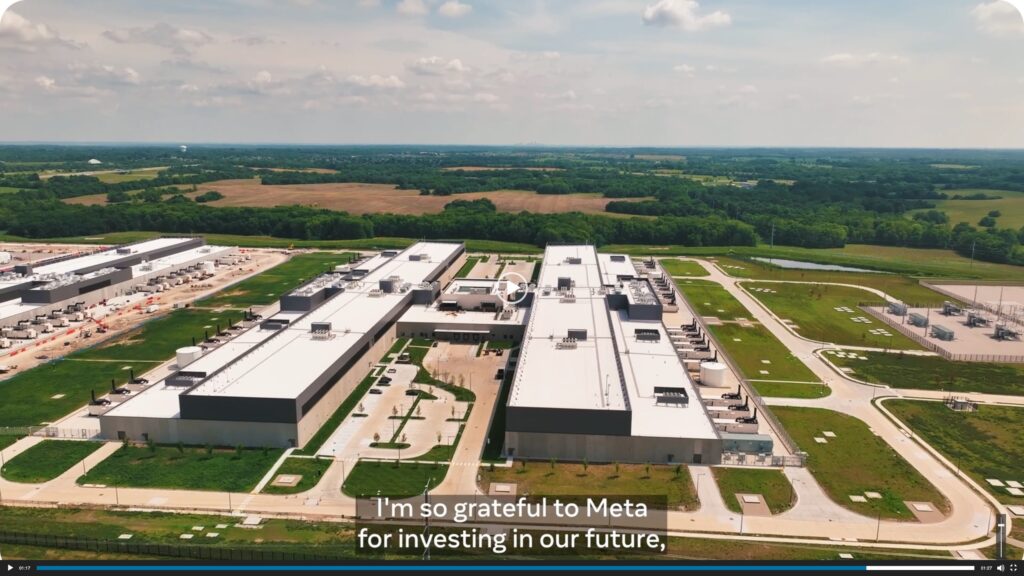Meta officially opened its new data center in Kansas City, Missouri, a project that began in 2022 and is now operational, serving millions of users worldwide. This digital infrastructure hub, representing an investment of over $1 billion, not only strengthens the company’s global network but has also become an engine of economic and technological growth for the region.
The choice of Kansas City was strategic. According to Brad Davis, Director of Economic and Community Development for Data Centers at Meta, the area offered an ideal combination: quality infrastructure, a strong power grid, local talent skilled in construction and operations, and a community ecosystem open to collaboration.
During the construction phase, the project employed over 1,500 specialized workers, and now, once operational, it will directly create more than 100 jobs. Since 2011, Meta’s various data center projects in the U.S. have generated over 30,000 construction jobs and currently support more than 5,100 permanent operational roles.
Beyond job creation, Meta has sought a close connection with the local community from the start. In the Kansas City area alone, the company has allocated over $1 million to schools and nonprofit organizations in Clay County, Platte County, and Kansas City, Missouri. It has also promoted Community Accelerator events to help local small businesses adopt digital skills and AI tools, such as Meta AI, to grow their operations.
Since fall 2024, funds have also been channeled through Data Center Community Action Grants, a grant program supporting community projects that leverage technology to improve citizens’ lives and promote education in STEAM disciplines (science, technology, engineering, arts, and mathematics).
The Kansas City data center holds LEED Gold certification, recognizing excellence in energy efficiency, water conservation, supply chain responsibility, and recycling. All of its power consumption is offset by 100% clean and renewable energy, a practice Meta maintains at its global data centers. Water use is also sustainable; the cooling system is significantly more efficient than industry average. During construction, rainwater collected in retention ponds inside the site saved over one million gallons of potable water.
Looking ahead, this milestone marks a turning point for Meta. The company is already working on developing a new generation of AI-optimized data centers, with the first facility expected in 2026. These centers will be designed for high performance, flexibility, and tailored hardware solutions, integrating AI to maximize resource efficiency.
Meta will continue collaborating with local electricity providers and energy suppliers to upgrade infrastructure and add new clean energy projects to the grid. Currently, the company is one of the world’s largest corporate purchasers of renewable energy, with over 15 gigawatts acquired across six countries.
Meta’s approach extends beyond merely building facilities. Its strategy involves integrating data centers into the economic and social fabric of their host communities, prioritizing local hiring, using domestic materials, and investing in educational and social initiatives. This ensures that technological progress also results in tangible benefits for local populations. As the company states, it aims to “build the future of human connection,” not only digitally but also through how communities interact with technology and prepare for tomorrow’s challenges.
The global surge in AI applications underpins Meta’s investments. From language models and virtual assistants to content management and the metaverse, AI demands unprecedented computing capacity. Developing AI-optimized data centers is both a logical step and a strategic necessity to ensure the company can compete in an environment where training speed, energy efficiency, and scalability are critical.
In summary, the Kansas City data center is more than a technological infrastructure; it symbolizes how digital giants are reshaping their roles within local communities. With multimillion-dollar investments, job creation, support for education, and a firm commitment to sustainability, Meta aims to establish a development model that connects global ambitions with local realities. These centers are poised to become drivers of AI innovation and catalysts for new economic and social opportunities in their regions.
Frequently Asked Questions (FAQ)
What has Meta invested in the Kansas City data center?
The investment exceeds $1 billion, with most materials sourced within the U.S.How many jobs does the Kansas City data center generate?
During construction, up to 1,500 specialized workers were employed. Once operational, it maintains over 100 permanent direct jobs.How does Meta ensure the sustainability of its data centers?
All centers operate on 100% renewable energy, hold LEED Gold certification, and use water-efficient cooling technologies that reduce water consumption.What will distinguish future AI-optimized data centers?
Starting in 2026, Meta will deploy facilities with custom hardware and AI-designed systems aimed at higher performance, flexibility, and resource efficiency.
via: about.fb.com

